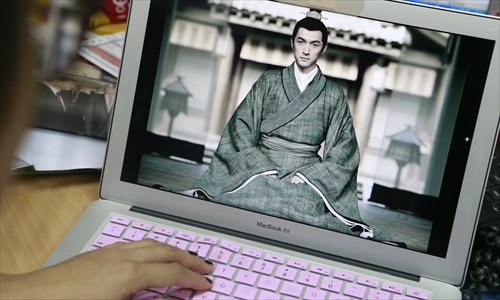HOME >> METRO BEIJING
Chinese power play
By Yin Lu Source:Global Times Published: 2015-11-2 20:13:01
Foreigners review latest hit TV drama Nirvana in Fire

The Chinese TV series Nirvana in Fire tells a story of revenge and attracts many foreigner viewers. Photo: Li Hao/GT
During Episode 54, Tarji Greene was moved to tears when Lin Shu was finally able to avenge his family and pay his respects at their tombs.She clapped and laughed at their cuteness when she saw the interactions between Lin and his teen guard Fei Liu throughout the whole TV series. She called it "a touching relationship that was more akin to a father-and-son relationship."
Greene, 48, from Florida in the US who works in the legal profession, is one of the many foreigner viewers of the Chinese TV series Nirvana in Fire.
The latest hit 54-episode drama is set in the 4th century and is a story of revenge. Lin Shu, the main character, was 17 when he lost his father and tens of thousands of soldiers to a political rival and managed to escape. He then established the Jiangzuo Alliance and returned to the capital for revenge 12 years later, under the name of Mei Changsu, where stories of brotherhood, political plots, power, love, loyalty, patriotic sentiment, and leadership talents entangle.
"His (Lin's) character was so conflicted in all of the emotions he had to carry. It was the weight of having to avenge his family and all the soldiers that wrongfully died, and not being able to reveal himself to those he truly loved and admired," said Greene. Greene has been watching Chinese cinema since the 1970s when martial arts movies were popular, and especially enjoys historical dramas.
Amy Sand (pseudonym) said that she is no stranger to the political plotting and machinations featured in Nirvana in Fire, because it mirrors similar themes that she's seen in other Chinese period dramas, such as "betrayal, pursuit of power, and secret identities."
According to the veteran Chinese drama enthusiast who works in health management in Singapore, the show is "a tastefully done Chinese period drama." The one thing she would like to see change is attention to detail like "the introduction of a little dirt."
"Like dirt on the hemlines of the costumes," she said.
A community sharing Asian TV dramas online has been formed by people like Sand. She has also become a contributor on video-streaming websites, specifically to support the Chinese subtitling and segmenting community.
Because the show has created a buzz on the TV drama forums like viki.com, 34-year-old American Marissa Anez also decided to watch it.
"My favorite character is Consort Jing because she's just so smart and calm even with all the political problems in the palace, and she's very clever with her words," Anez said.
However, some values and logic conveyed in the show can be confusing to foreigner viewers.
For Anez, it is the "premise of how a man can have a wife and multiple concubines" and "how the servants are immediately killed off as soon as they don't comply with the higher-ranked people."
"No justice is given," she said.
Comparing Nirvana in Fire with other Western TV series of this genre that also focus on power play set in a historical background, Greene said that she thinks, "Asian historical dramas are much better at conveying honor and respect to royals."
"As for shows like Game of Thrones, the power plays are more driven by sex and death than the strategy underneath," she said.
Critic Yun Feiyang said that between the two fictional historical dramas, Game of Thrones is better in terms of the script. "The biggest difference is that in Game of Thrones, there are both evil and good elements in every character and situation. And there's no absolute justice. But Nirvana in Fire features pure evil and pure justice, with a clear distinction," he said.
Right now and in the near future, Chinese dramas will still focus on domestic needs, instead of figuring out the tastes of audiences overseas because both the investment and profits are almost entirely from inside the country, according to Yun.
Still, he has his own ideas on how the show could be improved.
"[I recommend] cutting one-fourth of the series to better adapt to Western audiences' viewing habits," he said.
Posted in: Intel